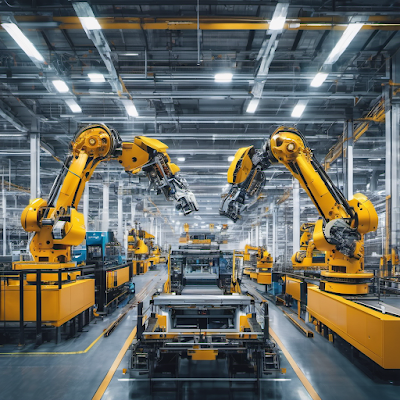In the dynamic landscape of manufacturing, the integration of Artificial Intelligence (AI) has become a pivotal force, reshaping traditional production methods and fostering efficiency. From predictive maintenance to automated quality control, AI applications are revolutionizing the manufacturing sector. This article delves into the profound impact of AI on production processes, exploring the transformative possibilities and benefits it brings to the industry.
I. Introduction to AI in Manufacturing
The manufacturing industry has witnessed a paradigm shift with the advent of AI. This section provides an overview of how AI is being incorporated into various facets of production, optimizing workflows and enhancing overall performance.
II. Predictive Maintenance: A Game-Changer
One of the key areas where AI is making significant strides is in predictive maintenance. Explore how AI algorithms analyze data to predict machinery breakdowns, reducing downtime and maintenance costs.
III. Enhanced Productivity through Automation
Automation, powered by AI, is streamlining production lines and accelerating manufacturing processes. This section elaborates on how AI-driven robots and machines are contributing to increased efficiency and productivity.
IV. Quality Control Redefined
Quality control is paramount in manufacturing, and AI is redefining standards. Discover how AI-powered systems can detect defects with unparalleled precision, ensuring only the highest quality products reach the market.
V. Supply Chain Optimization with AI
Efficient supply chain management is critical for manufacturing success. Learn how AI algorithms are optimizing supply chains by predicting demand, reducing lead times, and minimizing operational costs.
VI. AI and Human Collaboration
Contrary to concerns about job displacement, AI is fostering collaboration between humans and machines. This section explores how AI augments human capabilities, leading to a more skilled and empowered workforce.
VII. Overcoming Challenges in AI Adoption
While the benefits of AI in manufacturing are evident, there are challenges to its widespread adoption. Discuss common hurdles and potential solutions, addressing concerns related to cost, implementation, and workforce training.
VIII. Case Studies: Success Stories in AI Integration
Highlight real-world examples of companies that have successfully embraced AI in manufacturing. Explore the positive impact on their bottom line, customer satisfaction, and overall operational efficiency.
IX. Future Trends: What Lies Ahead
Delve into the future trends of AI in manufacturing, including advancements in machine learning, robotics, and the potential for AI to drive innovation and competitiveness in the industry.
X. Ethical Considerations in AI Manufacturing
As AI becomes more ingrained in manufacturing processes, ethical considerations emerge. Discuss the importance of responsible AI use, addressing concerns related to privacy, data security, and transparency.
XI. The Role of Governments and Policies
Explore the role of governments in shaping the AI landscape for manufacturing. Discuss policies, regulations, and incentives that encourage responsible AI adoption and innovation.
XII. AI Integration in Small and Medium Enterprises (SMEs)
Highlight how AI is not exclusive to large corporations. Discuss initiatives and strategies for SMEs to embrace AI technologies, leveling the playing field and fostering industry-wide innovation.
XIII. Training the Workforce for the Future
The integration of AI necessitates a skilled workforce. Discuss the importance of training programs, reskilling initiatives, and educational partnerships to prepare the workforce for the evolving demands of AI-driven manufacturing.
XIV. Industry Collaboration and Knowledge Sharing
Foster a sense of community within the manufacturing industry by highlighting the importance of collaboration and knowledge sharing. Discuss how industry players can collectively drive advancements and address challenges related to AI adoption.
XV. Conclusion
In conclusion, the impact of AI on manufacturing is transformative. From predictive maintenance to ethical considerations, the integration of AI is shaping the industry's future. As we move forward, responsible adoption and continuous innovation will be key in harnessing the full potential of AI in manufacturing.
FAQs
Is AI only beneficial for large manufacturing companies?
- No, AI offers benefits for businesses of all sizes. Small and medium enterprises can leverage AI to enhance efficiency and competitiveness.
How can AI improve supply chain management in manufacturing?
- AI can predict demand, optimize inventory, and streamline logistics, leading to a more efficient and cost-effective supply chain.
Are there concerns about job loss due to AI in manufacturing?
- While automation may change job roles, AI also creates new opportunities and enhances collaboration between humans and machines.
What ethical considerations should be taken into account when implementing AI in manufacturing?
- Privacy, data security, and transparency are crucial ethical considerations. Implementing responsible AI practices ensures a positive impact.
How can SMEs afford AI integration into their manufacturing processes?
- Various government initiatives, grants, and collaborative efforts can support SMEs in adopting AI technologies cost-effectively.


Comments
Post a Comment